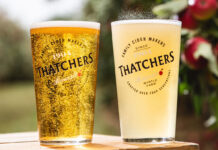Licensees have more mixers to choose from than ever

CHOOSING which tonics and mixers to stock used to be much more straightforward.
But as the number of mixers on the market has grown – and the breadth of flavours expanded – licensees are faced with more choice than ever.
Are a few mixers enough, or should licensees stock a mixer for every gin?
Don Lawson, founder of Love Tonic, said there has been “a push towards premium tonics and mixers, and we would expect to see more of these”.
And in line with trends in other drinks categories, Lawson pointed to healthier mixers, in particular, as likely to prove popular with consumers this year as they “seek out products with less sugar and additives”.
This was supported by Rosie Crossman, senior brand manager for Franklin & Sons at parent company Global Brands, who said 65% of consumers are now “actively trying to make healthier choices and searching for natural ingredients in their drinks”.
Health isn’t the only factor, however, and while drinks firms said a mixers range can be kept small, they stressed the importance of stocking a broad enough range that each gin has a complement.
“The perfect range is one that has been designed to include versatile flavours which pair with all key types of gin,” said Crossman.
“The range should include a flavour to suit every taste, without there being too many SKUs, making it easy for bartenders to know their pairings and find something to enhance any drink.”
Neil Everitt, chief executive of Brockmans Gin, supported this, saying operators “should look for a small range of tonics that offer different flavour profiles”.
“Make sure the tonic variants suit the range of gins you list,” said Everitt.
And licensees were reminded that tonic isn’t the only mixer suited to premium gins.
Jonny Lyall at Pickering’s said: “Personally, I thoroughly enjoy ginger ale as a mixer and have found this to be growing in popularity, not just for gin either.
“A good ‘not tonic’ alternative is something I think will need to be a must stock in the near future for those that want to drink gin but cannot do tonic.
“I think a rise in fruit-flavoured soda waters will target those who dislike tonic and will be a great way to offer them something else but that is just as delicious.”
How to build a gin range
“Even the smallest bar can offer five to ten gins that are distinctively different and each have a story to tell.”
– Brockmans
“Offer a range of recognised premium gins and gins with a distinct point of difference.
“Mainstream gins are necessary to satisfy consumer demand, but there are premium brands within the mainstream that consumers recognise and will purchase if cheaper mainstream brands are not available.”
– Crossbill Distilling
“The gin market is vast but having variations of strengths and flavours will encourage customers to try something new.”
– Loch Lomond Group
“I would always say local is better; it allows an easy upsell from the mainstream as there is a personal touch and the ability for the bartender to tell the brand’s story.”
– Pickering’s
























